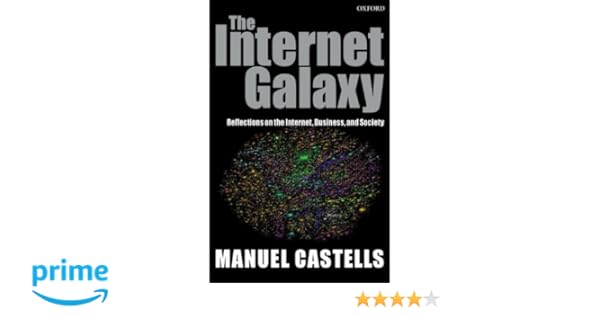
Castells The Internet Galaxy Pdf To Word
Far-reaching analysis by the author of the Information Age trilogy ( The Rise of the Network Society, not reviewed, etc.) of the Internet’s birth and its impact on a range of human activities, including business, social relationships, and politics. Castells (Planning and Sociology/Univ. Of California, Berkeley) begins his study by looking at the creation of the Internet, developed not by business but in government institutions, universities, think tanks, and research centers: environments that fostered freedom of thinking and innovation. Its origins, he points out, are what have given the Internet its most distinctive features, openness in technical architecture and social forms and uses, and business built upon these features when it became the driving force behind the Internet’s rapid expansion in the 1990s.
Castells examines the new economy in some detail, looking at the relationship between the Internet and capital markets, changes in employment practices, and networking as a management tool. With a new economy based on the culture of innovation, risk, and expectations, Castells sees the emergence of a new kind of business cycle characterized by volatile, information-driven financial markets. Turning to the impact of the Internet on social relationships, he notes a new pattern of sociability, “networked individualism,” in which individuals build their networks on- and offline on the basis of values, interests, and projects. Castells observes that while the Internet has the potential to strengthen democracy through broadening the sources of information and enabling greater citizenship participation, it has at the same time contributed greatly to the politics of scandal. He also looks at unresolved issues of privacy and security, describing the Internet as “contested terrain, where the new, fundamental battle for freedom in the Information Age is being fought.” In his sobering final chapter, the author studies the divide between peoples and regions that operate in the digital world and those that cannot. Absorbing history—but, with the jargon of academic sociology, an arduous read.
› Contents • • • • • • • • • • • • • • • • • Overview [ ] The book contains 9 chapters. Castells starts with the history of Internet, focuses on the process of Internet evolution influence our society.
Borland delphi 5 full download windows 10. The Internet Galaxy: Reflections on the Internet, Business, and Society. By Manuel Castells. Manuel Castells, network, network society, informationalism, The Information Age, social theory. In other words, Castells did not analyze social. Harris (2010: 409) in his review of Castells' The Internet Galaxy, the book in. Www.umass.edu/digitalcenter/research/pdfs/JF_NetworkSociety.pdf (accessed 10 July 2011).
He emphasizes the development of Internet from 1962 to 1995, the extension from to. (2001) The Internet Galaxy, Reflections on the Internet, Business and Society.
Oxford: Oxford University. Commission of the European Communities (2007) Third Annual Report on Migration and Integration, immigration/docs/com_2007_512_en.pdf. Castells believes that 'The openness of the Internet's architecture was the source of its main strength'. Then he states that the 'Internet Culture' is structured by four kinds of culture including: 'the techno-meritocratic culture', 'the culture', 'the virtual communication culture', and 'the entrepreneurial culture'. Next, Castells analyses the vital status of Internet in the business and economy fields, and he refers to the impact of virtual communication which is based on the Internet communication to the reality in the following chapter. In terms of the Politics of the Internet, Castells points that 'social movement' and 'the political process' use Internet as a new communication medium to 'acting' and 'informing'. And there is an issue between 'Privacy and Liberty in Cyberspace' relates to 'the politics of the Internet' is mentioned in this book.
Install iis 51 xp without cd file. Microsoft points out that IIS is tightly integrated with the Windows NT and 2000 Servers in a number of ways, resulting in faster Web page serving.
In the last three chapters, Castells analyses the Internet from, geography and 'the digital divide in a global perspective'. Finally, he talks about the challenges of the network society such as freedom of the Internet.
Opening: The Network is the Message [ ] The title used for the preface or introductory text is called 'Opening' and the name given to this Opening is 'The Network is the Message'. It is a mimicry of 's famous slogan '. By substituting network for medium, Castells reinforces McLuhan's message that, in this case, it is the network which is important not the content. The opening may then be seen to be an invitation to explore the meaning of network via the content of the book. The word network itself is of ambiguous interpretation: infrastructure or society? Both interpretations are at play in the book. Since Castells is by profession a sociologist, then one expects a focus on network as society.